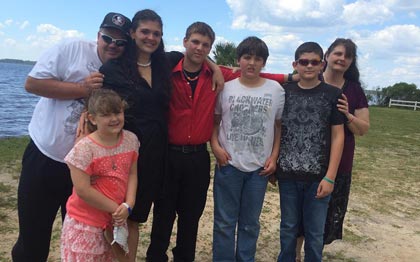The plight of refugees is not just a news story to the Rev. Stanislov Prokhorov. It's a reality he confronts nearly every day.
A deacon at Samara United Methodist Church in Russia, Prokhorov coordinates a new ministry that provides resources to people escaping the conflict in Ukraine, as well as immigrants from the Middle East, former Soviet republics, the Caucasus and China.
Called Gostepriimstvo, or hospitality, the ministry helps newcomers obtain food, housing and health and legal services. So far, it has had close contact with seven to 10 people and provided one-time advisory help to about 50.
That is in a city with an estimated 10,000 war refugees and 80,000 immigrants, Prokhorov says. Given those numbers, the ministry also aims to raise awareness among the city's residents about the needs of refugees.
 |
| Family members joined Titus 2 student Lisa Carter (black dress) as she celebrated her baptism. Courtesy Cathy Byrd. |
"There are thousands of families from Ukraine who barely have resources to start their life in a new city," Prokhorov said. "Our main goal is to help refugees adapt. ... We also want to show them Christ through our ministry. We understand that it is a challenge and a great responsibility for us."
Prokhorov is quick to note he is not alone in the effort. Church members and other volunteers who are lawyers, counselors and administrators offer expertise. He says the ministry is "a meeting place of those ready to help and those in need."
That is how it is supposed to be, says the Rev. Victoria Rebeck, director of deacon ministry support and certification programs at the General Board of Higher Education and Ministry.
Wherever deacons serve, she says, they are always "pointing people to see where God is calling them to be in ministry to the needy of the world."
The United Methodist Church has more than 1,100 active ordained deacons in the United States and others in the central conferences who are helping members meet the needs of people outside the church.
The Rev. Cathy Byrd, a deacon in the Alabama-West Florida Conference, felt called to help found Titus 2 Partnership, a residential program to help women overcome substance abuse issues, reenter society after incarceration, escape human trafficking and exit the sex industry.
The overarching goal of the ministry, based in Panama City, Fla., is "women mentoring women in Christ for life recovery from substance abuse and other life-limiting dysfunctions," says Byrd.
Rebeck believes the number of deacons working outside the church to engage laity in active discipleship is increasing. The Rev. Anika Jones says that has always been her calling.
A deacon in the North Georgia Conference, Jones is founder of Atlanta-based Alpha and Omega Society Inc. and its Women in Transition program.
The ministry, Jones says, mobilizes people of faith to help women successfully transition into the community after leaving prison.
That engagement transforms the world and the church, Rebeck says, especially in a denomination concerned about membership decline.
It's an exciting movement, Rebeck adds, and one "where we need to be."
Tita Parham, communications consultant, writer and editor based in Apopka, Fla.
One of seven apportioned giving opportunities of The United Methodist Church, the World Service Fund is the financial lifeline to a long list of Christian mission and ministry throughout the denomination. Please encourage your leaders and congregations to support the World Service Fund apportionment at 100 percent.
This article was first published in the November/December 2015 issue of the Interpreter Magazine.





